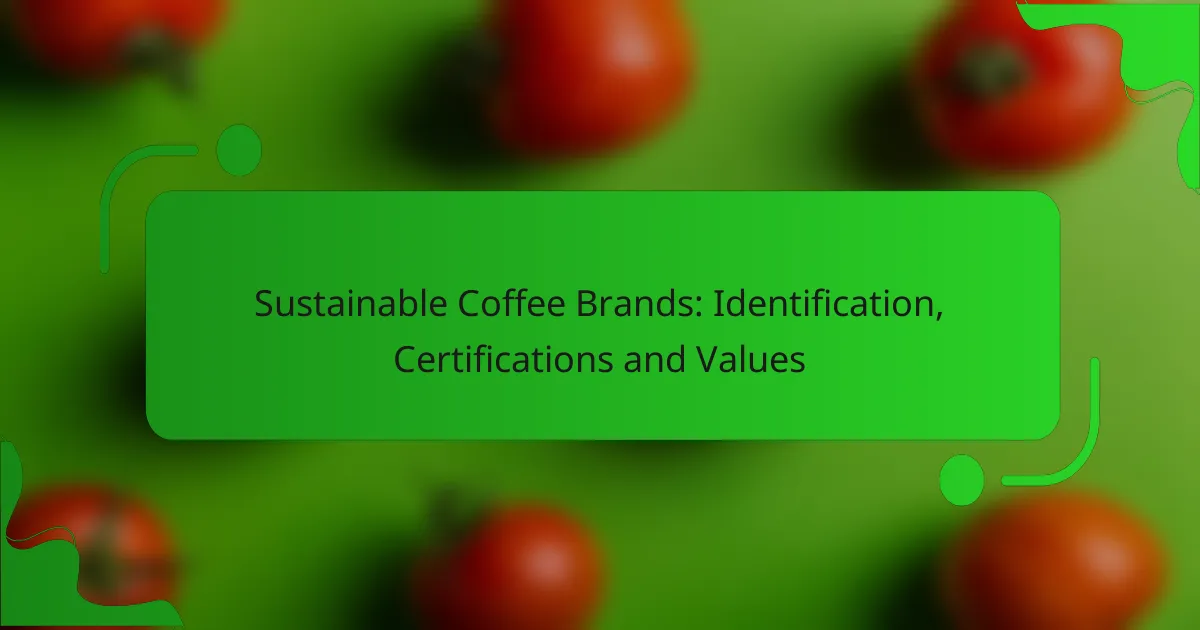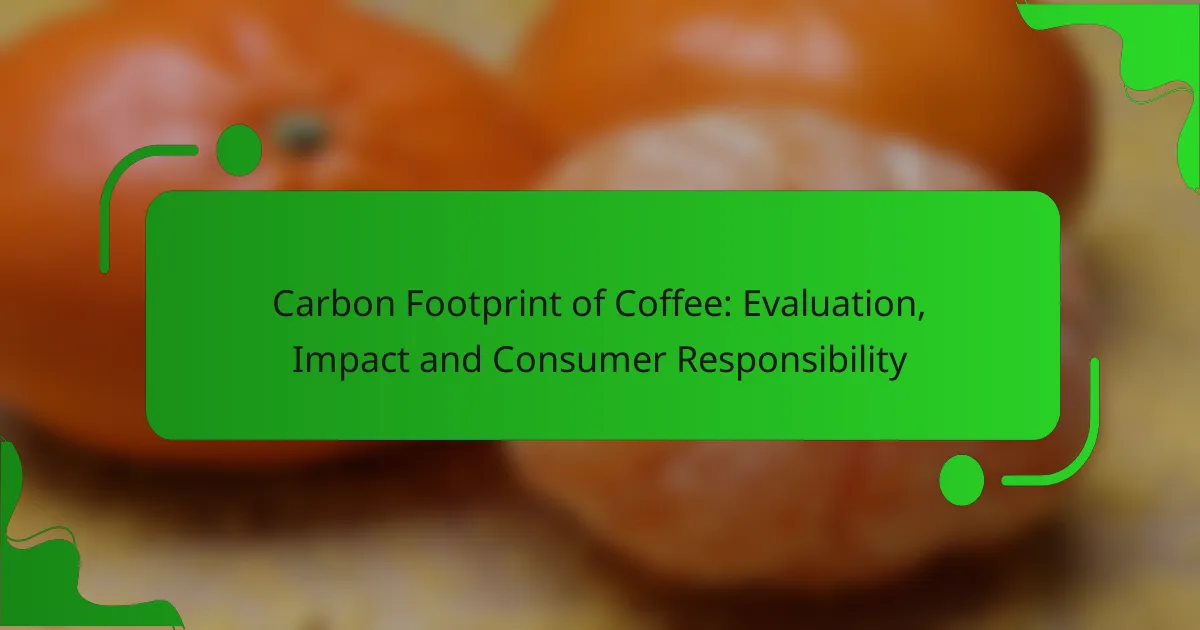Sustainable coffee brands are dedicated to ethical sourcing and environmental stewardship, offering consumers a choice that aligns with their values. By prioritizing fair trade practices, organic farming, and eco-friendly packaging, these brands contribute to a more responsible coffee industry. When selecting sustainable coffee, look for certifications that guarantee ethical production and minimal ecological impact.

Which sustainable coffee brands are available in the US?
Several sustainable coffee brands are available in the US, each committed to ethical sourcing and environmental responsibility. These brands often emphasize fair trade practices, organic farming, and eco-friendly packaging.
Stumptown Coffee Roasters
Stumptown Coffee Roasters is known for its direct trade model, which connects farmers directly with the brand, ensuring fair compensation. They prioritize sourcing high-quality beans from sustainable farms, often highlighting their partnerships with growers who practice environmentally friendly methods.
Their commitment to sustainability extends to their packaging, which is designed to minimize environmental impact. Stumptown also offers a range of organic options, appealing to health-conscious consumers.
Blue Bottle Coffee
Blue Bottle Coffee focuses on freshness and quality, sourcing beans from sustainable farms that adhere to strict environmental standards. They emphasize organic and direct trade practices, ensuring that farmers receive fair wages while maintaining high-quality production.
Additionally, Blue Bottle is committed to reducing waste through their packaging and by encouraging customers to use reusable containers. Their cafes often feature eco-friendly practices, making them a popular choice for sustainability-minded coffee lovers.
Intelligentsia Coffee
Intelligentsia Coffee is a pioneer in the direct trade movement, working closely with farmers to ensure ethical sourcing and sustainable farming practices. They emphasize transparency in their supply chain, allowing consumers to trace the origins of their coffee.
The brand also invests in community development projects in coffee-growing regions, further enhancing their commitment to sustainability. Intelligentsia’s focus on quality and ethical sourcing makes it a leading choice for conscious consumers.
Counter Culture Coffee
Counter Culture Coffee is dedicated to sustainability through its commitment to direct trade and environmental stewardship. They work with farmers who use organic and regenerative farming practices, ensuring that their coffee is both high-quality and eco-friendly.
The brand also offers educational resources on sustainability and coffee sourcing, helping consumers make informed choices. Their focus on innovation and sustainability has earned them a loyal following among environmentally conscious coffee drinkers.
Peet’s Coffee
Peet’s Coffee has made significant strides in sustainability by sourcing beans from certified farms that adhere to fair trade and organic standards. They prioritize partnerships with growers who focus on environmentally friendly practices, ensuring a positive impact on the communities they serve.
Peet’s also engages in various sustainability initiatives, including reducing waste and promoting recycling in their packaging. Their commitment to quality and ethical sourcing makes them a reliable option for those seeking sustainable coffee in the US.

What certifications should I look for in sustainable coffee?
When seeking sustainable coffee, look for certifications that indicate ethical sourcing and environmental responsibility. These certifications help ensure that the coffee is produced under fair labor practices and with minimal ecological impact.
Fair Trade Certification
Fair Trade Certification focuses on ensuring that coffee farmers receive fair wages and work under safe conditions. This certification promotes sustainable farming practices and supports community development projects.
When purchasing Fair Trade coffee, look for the Fair Trade Certified label, which guarantees that producers earn a minimum price for their beans, often above market rates. This helps protect farmers from volatile market fluctuations.
Rainforest Alliance Certification
The Rainforest Alliance Certification emphasizes environmental sustainability and biodiversity conservation. Coffee producers must adhere to strict guidelines that protect ecosystems and promote wildlife habitats.
Look for the Rainforest Alliance Certified seal on coffee packaging, which indicates that the coffee was grown using practices that support sustainable land use and protect natural resources.
USDA Organic Certification
USDA Organic Certification ensures that coffee is grown without synthetic fertilizers, pesticides, or genetically modified organisms. This certification promotes ecological balance and biodiversity in farming practices.
When choosing USDA Organic coffee, check for the USDA Organic seal, which guarantees that at least 95% of the product’s ingredients are organic. This certification also supports soil health and reduces pollution.
Bird Friendly Certification
Bird Friendly Certification is focused on protecting bird habitats by promoting shade-grown coffee practices. This certification ensures that coffee is grown in a way that supports avian biodiversity and forest conservation.
To find Bird Friendly coffee, look for the Bird Friendly label, which indicates that the coffee is grown under a canopy of trees, providing essential habitat for various bird species while maintaining ecological integrity.

How do sustainable coffee brands demonstrate their values?
Sustainable coffee brands showcase their values through transparent practices, ethical sourcing, and community engagement. They often adhere to specific certifications and standards that reflect their commitment to environmental and social responsibility.
Direct trade practices
Direct trade practices involve coffee brands sourcing beans directly from farmers, bypassing intermediaries. This approach allows brands to establish fair prices that benefit growers, often resulting in higher quality coffee. For example, brands may pay farmers 25-50% above the market price to ensure they receive a livable wage.
Brands that engage in direct trade often build long-term relationships with farmers, fostering trust and collaboration. This transparency helps consumers understand the origins of their coffee and the ethical practices behind it.
Environmental sustainability initiatives
Environmental sustainability initiatives focus on reducing the ecological impact of coffee production. Many brands implement practices such as organic farming, which avoids synthetic pesticides and fertilizers, and promotes biodiversity. This can lead to healthier ecosystems and improved soil quality.
Additionally, brands may invest in renewable energy sources for processing facilities or adopt water conservation techniques. Some companies even participate in reforestation projects to offset their carbon footprint, demonstrating a commitment to preserving natural resources.
Community support programs
Community support programs are designed to uplift local populations where coffee is grown. These initiatives can include funding for education, healthcare, and infrastructure improvements. Brands often collaborate with local organizations to ensure their contributions meet the specific needs of the community.
For instance, some coffee brands provide scholarships for farmers’ children or support women’s cooperatives, empowering them economically. By investing in community development, these brands reinforce their commitment to social responsibility and sustainable practices.

What are the benefits of choosing sustainable coffee?
Choosing sustainable coffee supports ethical practices and promotes environmental health. Sustainable coffee brands prioritize fair trade, eco-friendly farming methods, and high-quality production, benefiting both consumers and producers.
Support for small farmers
Sustainable coffee brands often work directly with small-scale farmers, ensuring they receive fair prices for their crops. This support helps improve the livelihoods of these farmers and their communities, fostering economic stability.
By purchasing sustainable coffee, consumers can contribute to initiatives that empower farmers through education, resources, and better access to markets. This creates a more equitable coffee supply chain.
Reduced environmental impact
Choosing sustainable coffee typically means supporting farming practices that minimize environmental harm. These practices include organic farming, shade-grown coffee, and reduced pesticide use, which help preserve biodiversity and soil health.
Additionally, sustainable brands often focus on reducing their carbon footprint through responsible sourcing and packaging. This commitment to environmental stewardship benefits ecosystems and helps combat climate change.
Higher quality coffee
Sustainable coffee is often associated with superior quality due to the careful cultivation methods employed by farmers. These methods emphasize flavor profiles and the preservation of unique characteristics inherent to different coffee varieties.
Consumers can expect a richer taste experience when choosing sustainable options, as these brands prioritize quality over quantity. This focus on excellence can lead to a more enjoyable coffee-drinking experience.

How can I identify local sustainable coffee brands?
To identify local sustainable coffee brands, look for certifications such as Fair Trade, Rainforest Alliance, or USDA Organic. Additionally, consider brands that emphasize ethical sourcing and environmental stewardship in their practices.
Look for Certifications
Certifications are a reliable way to determine if a coffee brand is sustainable. Fair Trade certification ensures that farmers receive fair wages and work under safe conditions. Rainforest Alliance certification indicates that the coffee is grown using methods that protect the environment and promote biodiversity.
USDA Organic certification guarantees that the coffee is grown without synthetic fertilizers or pesticides. When shopping, check the packaging for these labels to make informed choices about sustainability.
Research Brand Values
Understanding a brand’s values can provide insight into its commitment to sustainability. Look for brands that openly share their sourcing practices, community involvement, and environmental initiatives. Many sustainable coffee brands publish detailed information on their websites about their supply chains and the impact of their operations.
Consider reaching out to brands directly if their sustainability practices are not clear. Engaging with them can help you gauge their commitment to ethical practices.
Support Local Roasters
Local roasters often prioritize sustainability and ethical sourcing due to their close relationships with farmers. They may offer unique blends that reflect the local culture and environment. Visiting local coffee shops can help you discover these roasters and learn more about their sourcing practices.
Additionally, local roasters typically have a smaller carbon footprint compared to larger brands, as they often source beans from nearby regions. Supporting them not only promotes sustainability but also strengthens your local economy.



